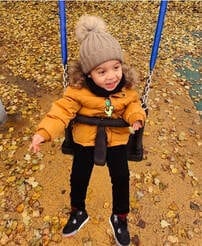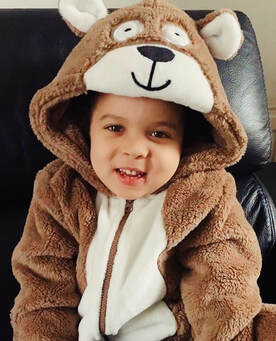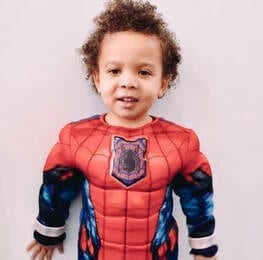We are so excited to share the third installment of our Autism Stories blog series with you all today! As a recap, our Autism Stories series at Always Keep Progressing will be giving voice to the various lived experiences of individuals who have been diagnosed with autism (and their families) from all around the world.
A: So, how’s the whole situation in London for you guys now?
J: I think the pandemic is tricky for everybody, but it’s especially tricky having a child with additional needs, because it’s hard to help him understand what’s happening. Obviously, he strives on his routine, so we’ve had a few rough days. Things are a bit better now, since this is becoming his new normal. It’s slightly better – he’s still not sleeping much – but it’s better than it was, definitely.
A: Are things beginning to open back up in London?
J: At the moment, they’ve said that different people from different households can meet, outside only. And I think some schools and non-essential shops are going to up on Monday. But it’s still the early days, and everything is still pretty much locked down. We’re in phase one.
A: We’re kind of in the same boat! Things are starting to open up but not fully yet, and there are a lot of regulations, of course.
 A: Could you tell me a little bit about Kaiden, when he was diagnosed, and the first signs you noticed?
A: Could you tell me a little bit about Kaiden, when he was diagnosed, and the first signs you noticed?
J: Kaiden was born with club foot, so he was born with one of his feet turned slightly in. This meant that he had quite a bit of medical treatment and intervention from a young age. He didn’t crawl until he was 11 months old, which we thought was due to the club foot, but now we’re guessing it probably wasn’t. But in general, we didn’t have indicators for a very long time. When Kaiden hit 13 or 14 months, we noticed that he stopped responding to his name, and eye contact was difficult for him. When I look back now, with what I know about autism, the signs were there, but I just didn’t know them at the time. Kaiden was never a social smiler, either. He would smile at people in his household (me and dad) but he was never that child on the bus trying to get other people’s attention. If anyone approached him in a crowd, he would turn away. We used to joke and say that he didn’t really like people, but now I think that was an indicator.
The turning point for me was when we were baby-sitting a child and he acted like the child wasn’t there. He completely looked through this child, and didn’t acknowledge the baby lying next to me, or me holding the baby. I became quite alarmed and started Googling, and all of these indicators of autism came up. Then, we went to a health visitor and she told us to do a hearing test, even though his hearing test at newborn had been fine. After the hearing test, we were told everything was fine, so we left it for a bit – you know, you get reassured that everything is fine. But, after a few months, I felt that something wasn’t right. As a parent, you just know deep down. He wasn’t meeting other milestones and I pushed again with the health visitor.
Finally, they brought him in for one of the developmental reviews and felt that he needed to go have a speech and language assessment. I think it was about 5 months of appointments and waiting lists with different professionals, so it was a very drawn out process. He was diagnosed in November 2018, and he was 2 years and 4 months old, so for us he was very young to get a diagnosis. They made it very clear, though, at the meeting that they were confident it was autism.
A: That’s interesting – I guess it takes a while because it’s difficult to get a hold of someone to do the evaluation or there’s a lack of therapists available?
J: It seems to be that the waiting list is oversubscribed. There are a lot of children in the area waiting for this assessment. It’s really great, in a way, that people are picking it up quickly and sending their children for these assessments, but there are children that are not being picked up until they’re in school. For them, that means there’s a difficult time of nearly a year waiting for the assessment, during which they’re also struggling at school and at home before they get the support they need. We were very fortunate that we were able to get the diagnosis when he was so young, at only 2 years and 4 months. I work in a sector with children and I think my knowledge of childhood development helped. I usually say to parents: you know your child better than anybody, and as a parent you just know. Sometimes, the health visitors are like, “You know, he’ll be fine!” If we hadn’t pushed, we might have still been floating through the system a bit more.
A: Right, because then it would still take a long time to get the assessment! That’s crazy. Here, there is definitely a need in the Miami area. There are never enough therapists in the world, honestly, but in this country, there are a lot more people going into this field and becoming therapists for kids with autism, so hopefully over time it will become less of an issue across the world.
J: There’s all these conversations about how there are more children being diagnosed, and I’ve been asked this question a lot by family and friends – why are children being diagnosed so much more now? Sometimes you even get people making ignorant remarks like: “What are they feeding these children? Everyone’s getting autism.” The reality is just that people are becoming more aware, and that’s a great thing for the children, because it’s being detected when they’re younger and early intervention is huge.
A: I completely agree. The thing that’s changing is that people are becoming more aware about autism and getting more knowledge.
J: And I would hope that the stigma is breaking down a little bit. I can imagine back in the day having a child with special needs was probably very difficult for parents to acknowledge themselves and to others. I hope the stigma is slowly becoming a little more broken down so that instead of saying “that child is just a little bit odd” or giving them a label, parents are able to say “my child has autism, and there’s a reason why my child behaves this way and has these difficulties,” so it can be only positive.
A: Yes, exactly. That’s why we’re doing this project – we just really want to show people what other parents are experiencing and going through, and what signs they’re seeing, so that people can be more aware and notice these things in their own children. This way, if their child does have some kind of delay, they will be able to seek services for early intervention and improve their prognosis.
J: That’s fantastic! All parents have is to turn to Google, which can be the scariest thing in the world. I think just being able to hear other parents’ stories and being able to relate will help a lot of families, definitely.
 bout the diagnosis? From your experience, what has life been like as a mom with a special needs child?
bout the diagnosis? From your experience, what has life been like as a mom with a special needs child? A: Honestly, I’ve never heard of that, but I’m really happy to hear that there’s a support system like that where you are. I’m sure there are support systems like that here and it would be great information to share with other people who feel like they’re all alone.
J: We got the diagnosis one day and then the day after, a letter came with the Early Birds leaflet. At first, I thought, “I’m not ready,” but if I’m honest it was the perfect time. The idea is that you do it very shortly after diagnosis because that’s the best time for learning information. Connecting with other parents was huge. To this day, we have a WhatsApp group where we communicate and share stuff. That was the turning point when I realized I needed a network. It’s really important to have people who are experiencing similar things. Obviously, it’s not really the same because everyone’s different and everyone’s experiences are different, but it was really important to me to have people who were feeling similar things to me. Even on those bad days when you’re feeling things you’re feeling guilty for feeling, just getting reassurance and validation that that’s okay and it will pass is so important.
A: I completely agree. I think that everyone needs to know there is a place to turn to. Especially now with the pandemic, it’s difficult for all parents, not having as much structure and having a child with special needs. I think that parents just need to feel supported and not alone, you know?
J: And that is where things like social media come in, too. At the moment, with the limited direct social networks around us, people are joining on more and more social media. There are massive communities on social media of autism families and lots of other conditions and disabilities as well. It’s nice to see how united some parents and family members can be. Me and my daughter set up a page, Kaiden’s armies, and we’ve just been linked up to a lot of different families who post things. We’ll think, “wow, that’s really similar to Kaiden,” or “oh God, Kaiden would never do that.” It’s really good seeing the spectrum. People often say that there are “really stereotypically autistic-related things or behaviors” but actually the spectrum is huge. Social media, used in the right way, is great for parents to see that spectrum and feel that sort of support.

A: Can you tell me some of the things that Kaiden struggles with and maybe some things he excels in?
J:Kaiden struggles with classical communication, so he’s nonverbal. He’s vocal, but doesn’t say any words yet, and that really affects his interactions with people because he can’t speak or articulate what he needs. He has learned a lot through speech and language therapy really, about how to pull you to things and gesture, but communication and interaction in general are difficult for him. Eye contact is limited and he doesn’t point at things. One thing that’s really difficult for me as his mom is that he’s got a very high pain threshold. He doesn’t know how to articulate when he’s in pain. The other day, he fell and scraped his little knees and you could see they were bleeding and he was really uncomfortable, but he doesn’t know how to verbalize his distress. Kaiden’s diet is also very limited. He loves fruit, but mostly he eats a lot of beige food and avoids vegetables. So we’re working on that.
 What does he excel in? The biggest thing is that he’s a really happy little boy. Everyone says this. Kaiden doesn’t know he’s different, and he’s not distressed. Kaiden is really happy and content most of the time. He’s always smiling, happy, or dancing. He can tolerate quite a lot of noise, and he’s quite adaptable in a lot of different ways which is really helpful. He can cope with minor changes most of the time. He excels in swimming, too, because he loves water and he’s been taking lessons since he was 8 weeks old. He didn’t love the rigidity of the lessons, but we still go every week and he’s really confident – he goes under the water. He’s like a fish, he definitely loves it. But, yeah, those are some of the things that make him happy and and that he thrives in doing.
What does he excel in? The biggest thing is that he’s a really happy little boy. Everyone says this. Kaiden doesn’t know he’s different, and he’s not distressed. Kaiden is really happy and content most of the time. He’s always smiling, happy, or dancing. He can tolerate quite a lot of noise, and he’s quite adaptable in a lot of different ways which is really helpful. He can cope with minor changes most of the time. He excels in swimming, too, because he loves water and he’s been taking lessons since he was 8 weeks old. He didn’t love the rigidity of the lessons, but we still go every week and he’s really confident – he goes under the water. He’s like a fish, he definitely loves it. But, yeah, those are some of the things that make him happy and and that he thrives in doing.“Kaiden doesn’t know he’s different, and he’s not distressed. Kaiden is really happy and content most of the time. He’s always smiling, happy, or dancing.”
A: How important is early intervention to you? What kinds of therapies does Kaiden receive now and what are they currently working on?
J: I’ll be honest – things are very difficult in terms of resources, so we had to really fight to try and get therapies in place for him. Actually, just before lockdown, we were trying to go private to get some support for him, so we’d signed up for a carousel therapy group – things like music therapy, art therapy, speech and language, occupational therapy, and then rotating in small groups. We were going to pay for that privately, because here you only get one therapy session or package per term. Every four months there is a new suggested offer. It can be things like nursery visits for an occupational therapist, which in turn are quite helpful, but it doesn’t feel like it’s enough. I think early intervention is crucial. It’s the age when they start making habits, thinking about their learning styles and their repetition, and for me it’s really important that at that age you see how they learn and you put the right package support in.
Kaiden has had speech and language, and that was amazing. During his first session, he learned from a motivational object, and for him it was bubbles. We would blow the bubbles and put the lid on, and Kaiden learned to gesture that he needed us to take the bubble lid off and give it back to us; that was how he learned the exchange. Literally, that opened up our whole lives. We were like, “OMG, now he gets that we’re here, and he knows how to have that day-to-day exchange with us,” so that was great. Kaiden has poor muscle tone, so he has occupational therapy as well. All of it is great, but it doesn’t always feel like it’s enough. I think that’s going to be something we see more as more children are diagnosed and need the support. Budgets keep getting cut and there aren’t enough services for everyone. The sad reality for us here in London is that, if you want your child to have additional therapy, you have to work for it.
A: Is it primarily insurance-based therapy?
J: No. Even for a child without a diagnosis, it’s supposed to be a need-led basis under something called the Education Health Care Plan. If your child is given an EHC plan, it means they quality for funding from local authorities to get support in school or nursery, and it becomes this package of care that you get that is directly tied to the local authority. You can apply for a personal budget and manage it yourself, technically, but there is a bit of reluctance for that to happen. The local government wants to have a package that they dictate and provide, and they have their community services so it’s a lot cheaper for them. Parents have to go to court to try and have the right to decide what services they use the money for, but it’s a very lengthy process, not only tiring but emotionally consuming. Here, it’s mainly through this EHC plan which opens up this world of services and support. We were very fortunate, because when Kaiden went to nursery initially at the age of two, he didn’t have an EHC plan. The nursery, though, felt it wasn’t safe for him to be outside on his own so they applied for their own funding for him, and they funded for him for some time until we got the EHC plan through. A lot of the time people don’t even get this power; EHC plans will get denied. If your EHC plan is accepted, it can be in place until the child is 25 years old, and so the local government has to be very careful who they give it to, since they have to keep paying for the child for a very long time. It just feels very difficult when you know your child needs it and you’re having to jump through hoops to get it.
A: I would hope that one day it’s much easier to get services because it’s very necessary. A lengthy process to get started is bad because that time is crucial, you know?
J: Some schools are very supportive, but it’s all about the budgets. They will try and support the child, but they can’t do it all for so many children, and that’s really difficult. I work in a sector with children, so I know or will research what I have to do. I really feel for the parents or the children of parents who don’t have that and who don’t know where to go or how to fight. It seems to me that there’s a pattern where everything is a “no” until you appeal and fight for it. There are a lot of parents who take the no and think, “Okay, fine, there’s nothing more I can do.” Those are the kids that are really suffering, with parents who don’t know how to fight for the services their children need or how to be an advocate. You have to, overnight, know everything: the legislation around SDN, how to get extra financial support, the loopholes, what to say, how to fill in the forms, and where to go. It’s a tricky world.
A: Yes, definitely. The one who really suffers at the end of the day is the child if they’re not getting the services.
A: What are five words you would use to describe your son and why?
 Strong, brave, beautiful, unique, and inspirational. All throughout everything for the last four years of his life, he’s just been the happiest little boy you can imagine, and he really is an inspiration to us. He’s changed my life, my whole family’s life. He’s changed the way we see things, the way that we acknowledge things, and how we embrace life. I can’t imagine life without him and I can’t imagine his journey being any different, although I wish in some ways it was. He just takes every challenge that comes his way and he smashes through it with a big smile on his face. On the days that I’m struggling, I look at him and feel that he’s my inspiration because he just gets on with it. He just gets up every day, despite the challenges that are there, despite the difficulties he’s having, and he works through it as best he can. He makes the most of life, and that is an inspiration to me, truly.
Strong, brave, beautiful, unique, and inspirational. All throughout everything for the last four years of his life, he’s just been the happiest little boy you can imagine, and he really is an inspiration to us. He’s changed my life, my whole family’s life. He’s changed the way we see things, the way that we acknowledge things, and how we embrace life. I can’t imagine life without him and I can’t imagine his journey being any different, although I wish in some ways it was. He just takes every challenge that comes his way and he smashes through it with a big smile on his face. On the days that I’m struggling, I look at him and feel that he’s my inspiration because he just gets on with it. He just gets up every day, despite the challenges that are there, despite the difficulties he’s having, and he works through it as best he can. He makes the most of life, and that is an inspiration to me, truly.A: The last question I have for you is how have you handled stress as a mom with a child on the spectrum, and what words of encouragement and advice do you have for other moms?
J: I feel really strongly about this. I want to advocate that there’s no harm in saying you find it difficult. I struggled for a long time, and it wasn’t until the end of the hardest year of my life that I felt like I needed to go speak with somebody. I would say my advice to other parents who are finding it stressful and difficult is: don’t be afraid to talk about it, and don’t feel guilty for talking about it. Your whole life changes overnight and there isn’t a manual. There is no shame in saying that you need help and you’re struggling, and that’s okay. I would say to parents not to blame yourself. It’s really important that you understand that autism is not something that you can prevent or cause. It’s something that happens, so it’s important not to blame yourself. I got told so many times that there were worse things that could have happened to Kaiden, and it made me feel so rubbish because it’s true – there are children dying and children with cancer. I felt so guilty that my son was alive but I was still feeling like this. Now I know it’s actually okay to feel this way. There are worse things that could happen, but it’s still life changing and you need to acknowledge that and work through all of the emotions. There are going to be a lot of tears and a lot of anxiety, but it’s a process. The most important thing is to hold on to hope, because it won’t always feel dark. Time will help and it will become the new normal (how you parent, how your child behaves, and things you can do to help).
Those are some little pieces of advice I found along the way that would have helped me if someone told me that back then. No matter what everyone tells you, you’re not going to feel okay initially, and it’s definitely going to feel difficult. Ge help if you need to, and really be articulate about your feelings, both positive and negative, because they’re important. Hold on to the fact that they’re still your child, with or without the diagnosis. Your child doesn’t change. You know, they’re exactly the same, just now with an identified understanding that you can use to help him or her.
A: I love that you guys celebrate every little milestone! Every achievement, no matter how big or small, needs to be celebrated. You guys should be proud of that. I really stress to clients, who are parents of children with autism, that this is a journey. It’s not about how fast we can get to the destination, it’s about the little things along the way. I’m really happy to hear that.
 That’s something I’m grateful for in this pandemic. I’m a working mom, and there are things I would have missed for sure if I weren’t at home at the moment with my kids. There are things that Kaiden does that I’m amazed by, and that he probably may have been doing for a while, but because I’m normally in this constant rushing about and multitasking, I might have missed it. I’m really grateful for this time I’ve got with both my kids, but particularly with Kaiden – just helping him, noticing things, and building on repeating the things we want to teach him.
That’s something I’m grateful for in this pandemic. I’m a working mom, and there are things I would have missed for sure if I weren’t at home at the moment with my kids. There are things that Kaiden does that I’m amazed by, and that he probably may have been doing for a while, but because I’m normally in this constant rushing about and multitasking, I might have missed it. I’m really grateful for this time I’ve got with both my kids, but particularly with Kaiden – just helping him, noticing things, and building on repeating the things we want to teach him.
A: That’s definitely one of the positive things we can take from everything going on – we have time to pause for a second and actually pay attention. To spend quality time with loved ones and be more present. Like you said, you can actually be there to witness and experience things with Kaiden, so that’s really awesome. Thank you so much for talking with me today and for letting us hear your story!
To read and see more about Kaiden, visit @kaidensarmy on Instagram!




0 Comments